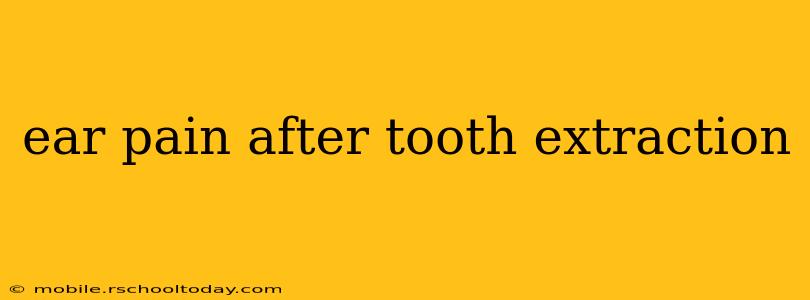Experiencing ear pain after a tooth extraction is a common concern for many patients. While seemingly unrelated, the proximity of teeth to the ear and the intricate network of nerves and tissues in the jaw can lead to referred pain. This means pain originating in one area (like the tooth socket) can be felt in another (like the ear). Understanding the causes, treatment options, and preventative measures can help alleviate discomfort and promote faster healing.
Why Does My Ear Hurt After a Tooth Extraction?
The connection between tooth extractions and ear pain lies primarily in the intricate anatomical structure of the head and neck. Several factors can contribute to this referred pain:
-
Nerve Irritation: The trigeminal nerve, a major cranial nerve responsible for sensation in the face, including teeth and jaw, also branches towards the ear. Inflammation or irritation of this nerve during or after the extraction can transmit pain signals to the ear.
-
Inflammation and Swelling: Post-extraction swelling is normal. However, significant swelling can put pressure on nearby structures, including the ear canal or middle ear, resulting in pain.
-
Sinus Infection (Rare): In some cases, particularly with upper molar extractions, infection can spread to the sinuses, leading to pain felt in the ear and teeth. This is less common but requires immediate medical attention.
-
Dry Socket (Alveolar Osteitis): A complication of tooth extraction where the blood clot protecting the socket dissolves prematurely. This exposes the bone, causing significant pain that can radiate to the ear. This is a serious complication requiring professional treatment.
How Long Does Ear Pain After Tooth Extraction Last?
The duration of ear pain varies depending on the individual, the complexity of the extraction, and the presence of any complications. Mild earaches typically subside within a few days, alongside the primary pain in the extraction site. However, persistent or worsening pain should prompt a visit to the dentist.
What Can I Do to Relieve Ear Pain After a Tooth Extraction?
Managing post-extraction ear pain involves both over-the-counter remedies and careful adherence to post-operative instructions:
-
Over-the-Counter Pain Relievers: Ibuprofen (Advil, Motrin) or acetaminophen (Tylenol) can help manage pain and reduce inflammation. Always follow the dosage instructions on the label.
-
Ice Packs: Applying ice packs to the affected cheek for 15-20 minutes at a time, several times a day, can help reduce swelling and alleviate pain.
-
Rest: Adequate rest is crucial for proper healing. Avoid strenuous activities that might increase blood flow to the extraction site and exacerbate pain.
-
Gentle Cleaning: Maintain good oral hygiene, but be gentle when cleaning near the extraction site to avoid dislodging the blood clot.
Is Ear Pain After Tooth Extraction a Sign of Infection?
While some ear pain is normal after a tooth extraction, persistent, severe, or worsening pain, especially accompanied by fever, swelling, or pus, could indicate an infection. Seek immediate dental attention if you suspect an infection.
When Should I Call My Dentist About Ear Pain After a Tooth Extraction?
Contact your dentist if:
- The ear pain is severe and doesn't improve with over-the-counter pain relievers.
- The pain worsens over time.
- You develop a fever or chills.
- You notice excessive swelling or bleeding.
- You see signs of infection, such as pus or discharge.
Can I Prevent Ear Pain After a Tooth Extraction?
While you can't always prevent referred pain, following your dentist's post-operative instructions carefully can significantly reduce the risk. This includes:
- Avoiding smoking and drinking through a straw, as suction can dislodge the blood clot.
- Avoiding rinsing vigorously.
- Eating soft foods initially.
- Taking prescribed medications as directed.
By understanding the potential causes, treatment options, and preventative measures, you can navigate the post-extraction period with greater comfort and confidence. Remember, always consult your dentist if you have any concerns about your post-extraction healing process.
